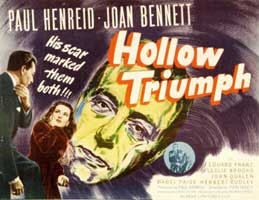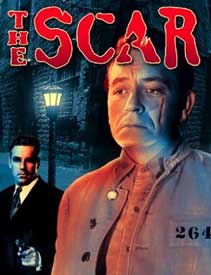Johnny Muller (Paul Henreid) is a racketeer in The Scar (aka, Hollow Triumph, 1948). He's just out of prison, having served time for a mining fraud. Johnny's the brains of a gang that has apparently done far less crime while he was in the pen. He gets them back together for his first plan, to knock over a dangerous mobster's casino. No one quite agrees this is a brainy plan, but Johnny pretty much forces his gang into obedience.
 Mobster Rocky Stansyck (Thomas Browne Henry), famed for getting the ultimate revenge on anyone who does him wrong, knows within minutes of the heist who is responsible. All too soon Johnny's gang is being picked off one by one. Johnny has to go into hiding, & takes an office job to lay low. Mobster Rocky Stansyck (Thomas Browne Henry), famed for getting the ultimate revenge on anyone who does him wrong, knows within minutes of the heist who is responsible. All too soon Johnny's gang is being picked off one by one. Johnny has to go into hiding, & takes an office job to lay low.
Viktor Bartok, a psychiatrist, is Johnny's double, except for having a scar on one cheek. Joan Bennett is the doctor's secretary & apparently his mistress.
For an alleged genius, seems to me Johnny works out a pretty stupid plan to kill the doctor &, working from a photograph, duplicating the scar on his own face. He has had a little bit of medical training so can fake it as a psychiatrist, & begins practicing the doctor's vocal inflections.
A smarter plan might have been to get the doctor killed in such a manner that the mob thinks they got Johnny, as they're never otherwise going to stop looking for him, & he's bound to be recognized in time, scar or no scar. But Johnny just kills the guy & dumps the body & only later discovers that the photograph he used to recreate the scar was a backward print & the new Dr. Bartok has the scar on the wrong side of his face.
A lot of the tension of the piece regards whether or not anyone who knew the doctor realizes the scar has changed sides of his face. One cool thing about the plot is that Johnny as Bartok goes a little mad because nobody does realize the scar is on the wrong side! He's simultaneously afraid someone will catch on, but alarmed that people are so little observant, to the point that when a charwoman (Mabel Paige) finally notices, he's actually grateful to her.
There are a few similar moments when the film expresses sentiments not totally expected. In the main the plot requires too many absurd leaps & gimmicks, starting with the tiresome gimmick of meeting one's exact double. Yet it's so seriously played with such a gloomy ending striving for irony, with such gorgeous shadow-ridden lighting, that the whole film works more than it does not as a damned good film noir.
copyright © by Paghat the Ratgirl
|

 Mobster Rocky Stansyck (Thomas Browne Henry), famed for getting the ultimate revenge on anyone who does him wrong, knows within minutes of the heist who is responsible. All too soon Johnny's gang is being picked off one by one. Johnny has to go into hiding, & takes an office job to lay low.
Mobster Rocky Stansyck (Thomas Browne Henry), famed for getting the ultimate revenge on anyone who does him wrong, knows within minutes of the heist who is responsible. All too soon Johnny's gang is being picked off one by one. Johnny has to go into hiding, & takes an office job to lay low.